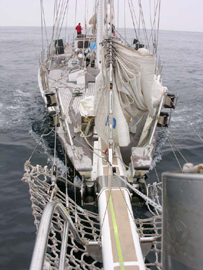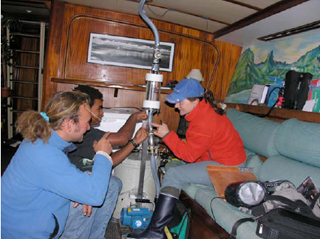Home Cytometry and Society Michel Denis

Flow Cytometry and Reintegration of Socially Isolated Youth
by Michel Denis

Two researchers (Melilotus Thyssen and Michel Denis) from the Laboratoire de Microbiologie, Géochimie et Ecologie Marines, Centre d’Océanologie de Marseille (LMGEM-COM, France) combined a scientific project with a program for at-risk youth. DEFERLANTE, an association under contract with social and judicial services, uses the ship Fetia Ura, a 33 m schooner (belonging to SARL SEANERGIES OCEANES) to help school dropouts and youth estranged from their families to regain self-confidence and build social connections through high-sea sailing.

The schooner Fetia Ura
The two researchers joined the Fetia Ura (a crew of 5 people, 2 instructors and 6 teenagers) at Horta (Faial, Azores Island) on its return from French Guyana. From 14 to 23 April 2007, the ACYPHAR (Atlantic flow CYtometry spatial study of PHytoplankton through Automated Recording) scientists studied the surface phytoplankton (< 50 μm) distribution between Horta and Lorient (France). A CytoSub (Cytobuoy) automated flow cytometer was used to analyse seawater pumped into a buffering reservoir every 15 min, which corresponded to a distance interval of about 2 nautical miles. In parallel, the seawater properties were determined with an autonomous CTD (SBE 37SMP). These high frequency measurements were collected to allow better characterization of the spatial heterogeneity of the oceanic phytoplankton distribution.
The scientists contributed to the reintegration program of DEFERLANTE by providing the teenagers and their instructors basic information on the ocean and the marine ecosystem. This took place through discussions and interactive Powerpoint presentations on board the boat. An epifluorescence microscope coupled to a CCD camera (CYSCOPE, Partec) was used to display on a computer screen organisms collected with a phytoplankton net. The teenagers were made responsible for some subsampling scheduled every 4 hours. Through the interaction with the scientists, the teenagers acquired a high interest for the marine environment, global change and scientific rigorousness. They thus became aware of the importance of marine phytoplankton as regulators of greenhouse gases and as the basis of the oceanic food chain.

Melilotus Thyssen explaining to a teenager, watched by a crew man, how to collect in the buffering reservoir, a subsample of the seawater just analyzed by the CytoSub, on the floor in its cylindrical housing. Photo M. Denis.
This novel positive impact of flow cytometry on society was a real success and will likely be repeated. The ACYPHAR cruise demonstrated the feasibility and cost-effectiveness of automated flow cytometry analysis of phytoplankton on board marine vessels. This original combination program provides the opportunity to collect valuable data that has been heretofore out of reach.

- Michel Denis
- michel.denis@univmed.fr
- or
- Melilotus Thyssen
- melilotus.thyssen@univmed.fr
